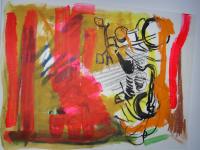 He’d spend hours scripting the captions, and if the papers changed them he’d write to the picture editor to complain. H’s obsession with providing the absolute explanation of the context of his photographs became compulsive. Sometimes he’d write several paragraphs detailing the personal histories of each person — or body — in the picture. He’d also include information about how he’d been feeling when he took the picture, whether he was scared, happy, jealous or guilty.
He’d spend hours scripting the captions, and if the papers changed them he’d write to the picture editor to complain. H’s obsession with providing the absolute explanation of the context of his photographs became compulsive. Sometimes he’d write several paragraphs detailing the personal histories of each person — or body — in the picture. He’d also include information about how he’d been feeling when he took the picture, whether he was scared, happy, jealous or guilty.
11.10.2010 | by Lara Pawson
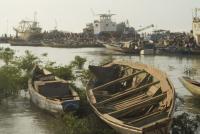 In July 2009, the campaign for the second round of presidential elections in Guinea-Bissau had been on the streets for a week. But the leading players are not only Kumba Ialá and Malam Bacai Sanhá, but also the people, who reject violence and fear the power of the military and narcotraffickers.
In July 2009, the campaign for the second round of presidential elections in Guinea-Bissau had been on the streets for a week. But the leading players are not only Kumba Ialá and Malam Bacai Sanhá, but also the people, who reject violence and fear the power of the military and narcotraffickers.
01.10.2010 | by Pedro Cardoso
 This article asserts that names are an important aspect of any language. It argues that they act as a summary statement of the lives of the named and or those who give the names. The paper further observes that names that the Shona give are an indicator of their response to their situation in life. The situation includes success, failure and misfortune. The paper also observes that some names start off as nicknames and end up becoming family names. It again highlights that some names are not permanent, especially to the younger ones. They can assume new ones, especially with the passage of time due to changed circumstances like when one assumes a titular name, especially when she or he becomes chief or head of a clan.
This article asserts that names are an important aspect of any language. It argues that they act as a summary statement of the lives of the named and or those who give the names. The paper further observes that names that the Shona give are an indicator of their response to their situation in life. The situation includes success, failure and misfortune. The paper also observes that some names start off as nicknames and end up becoming family names. It again highlights that some names are not permanent, especially to the younger ones. They can assume new ones, especially with the passage of time due to changed circumstances like when one assumes a titular name, especially when she or he becomes chief or head of a clan.
25.09.2010 | by Shumirai Nyota
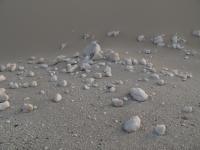 I can say, perhaps, that this trip has increased our awareness of the uncontrollable aspects of nature (the Icelandic volcano has now served notice to the oblivious) and revealed to us the existence of populations that are able to combine complex social organization and ownership of simple natural resources, which can only be the result of their deep knowledge of the territory.
I can say, perhaps, that this trip has increased our awareness of the uncontrollable aspects of nature (the Icelandic volcano has now served notice to the oblivious) and revealed to us the existence of populations that are able to combine complex social organization and ownership of simple natural resources, which can only be the result of their deep knowledge of the territory.
22.09.2010 | by Cristina Salvador
 Among us Angolan refugees, especially among the elders, there were those who had a special passion for the Portuguese language. I recall spending holidays at Uncle Jeremias Bandua’s house in Meheba refugee camp. In the day, we would often go to the fields to look after the vegetables etc with older Angolan men. Some of these men were also on holidays as they had scholarships and were attending different college in the urban areas.
Among us Angolan refugees, especially among the elders, there were those who had a special passion for the Portuguese language. I recall spending holidays at Uncle Jeremias Bandua’s house in Meheba refugee camp. In the day, we would often go to the fields to look after the vegetables etc with older Angolan men. Some of these men were also on holidays as they had scholarships and were attending different college in the urban areas.
03.09.2010 | by Sousa Jamba
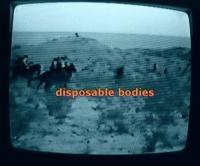 I have decided to act in the symbolic realm. The aim is not to change the world out there but the discourse about the world out there. To sharpen the consciousness about ones proper accountability for global developments. In my artistic and textual work, I try to elaborate on the correlation between high-technologized societies and the production of precarious living conditions. One of my prime concerns is the willingness to recognize that causes and solutions are not always located somewhere on the “outside”.
I have decided to act in the symbolic realm. The aim is not to change the world out there but the discourse about the world out there. To sharpen the consciousness about ones proper accountability for global developments. In my artistic and textual work, I try to elaborate on the correlation between high-technologized societies and the production of precarious living conditions. One of my prime concerns is the willingness to recognize that causes and solutions are not always located somewhere on the “outside”.
27.06.2010 | by Ursula Biemann
 “Geo-archaeological research(GAR)” is a research, held initially in Weimar (Germany), which has indicated several phases of work and diverse areas as fieldwork. This research aims to understand specific intercontinental geological phenomena, proposing the hypothesis of a geological fault, which took place in Europe and had other repercussions.
“Geo-archaeological research(GAR)” is a research, held initially in Weimar (Germany), which has indicated several phases of work and diverse areas as fieldwork. This research aims to understand specific intercontinental geological phenomena, proposing the hypothesis of a geological fault, which took place in Europe and had other repercussions.
28.05.2010 | by Tânia da Fonte
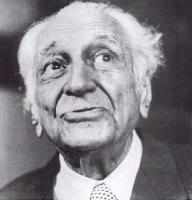 Recent critical readings of Cape Verdean identity and intellectual history highlight the fact that Gilberto Freyre unknowingly destabilized the metanarrative of Euro-centered mestiçagem, by emphasizing instead Cape Verde’s cultural links to Africa (even if those links were impressionistically perceived by him).
Recent critical readings of Cape Verdean identity and intellectual history highlight the fact that Gilberto Freyre unknowingly destabilized the metanarrative of Euro-centered mestiçagem, by emphasizing instead Cape Verde’s cultural links to Africa (even if those links were impressionistically perceived by him).
26.05.2010 | by Fernando Arenas
 It seems useful to delineate a genealogy of black internationalism as way to understand it's formation. Africa's independencies, beyond the action of africans and africans among the diaspora, take place due to a number of structural shifts. If we place the emergence of african internationalism in a broader perspective it will allow for a understanding of the paradigm changes that took place at the turn of the century.
It seems useful to delineate a genealogy of black internationalism as way to understand it's formation. Africa's independencies, beyond the action of africans and africans among the diaspora, take place due to a number of structural shifts. If we place the emergence of african internationalism in a broader perspective it will allow for a understanding of the paradigm changes that took place at the turn of the century.
15.05.2010 | by António Tomás
 He’d spend hours scripting the captions, and if the papers changed them he’d write to the picture editor to complain. H’s obsession with providing the absolute explanation of the context of his photographs became compulsive. Sometimes he’d write several paragraphs detailing the personal histories of each person — or body — in the picture. He’d also include information about how he’d been feeling when he took the picture, whether he was scared, happy, jealous or guilty.
He’d spend hours scripting the captions, and if the papers changed them he’d write to the picture editor to complain. H’s obsession with providing the absolute explanation of the context of his photographs became compulsive. Sometimes he’d write several paragraphs detailing the personal histories of each person — or body — in the picture. He’d also include information about how he’d been feeling when he took the picture, whether he was scared, happy, jealous or guilty.  In July 2009, the campaign for the second round of presidential elections in Guinea-Bissau had been on the streets for a week. But the leading players are not only Kumba Ialá and Malam Bacai Sanhá, but also the people, who reject violence and fear the power of the military and narcotraffickers.
In July 2009, the campaign for the second round of presidential elections in Guinea-Bissau had been on the streets for a week. But the leading players are not only Kumba Ialá and Malam Bacai Sanhá, but also the people, who reject violence and fear the power of the military and narcotraffickers.  This article asserts that names are an important aspect of any language. It argues that they act as a summary statement of the lives of the named and or those who give the names. The paper further observes that names that the Shona give are an indicator of their response to their situation in life. The situation includes success, failure and misfortune. The paper also observes that some names start off as nicknames and end up becoming family names. It again highlights that some names are not permanent, especially to the younger ones. They can assume new ones, especially with the passage of time due to changed circumstances like when one assumes a titular name, especially when she or he becomes chief or head of a clan.
This article asserts that names are an important aspect of any language. It argues that they act as a summary statement of the lives of the named and or those who give the names. The paper further observes that names that the Shona give are an indicator of their response to their situation in life. The situation includes success, failure and misfortune. The paper also observes that some names start off as nicknames and end up becoming family names. It again highlights that some names are not permanent, especially to the younger ones. They can assume new ones, especially with the passage of time due to changed circumstances like when one assumes a titular name, especially when she or he becomes chief or head of a clan.  I can say, perhaps, that this trip has increased our awareness of the uncontrollable aspects of nature (the Icelandic volcano has now served notice to the oblivious) and revealed to us the existence of populations that are able to combine complex social organization and ownership of simple natural resources, which can only be the result of their deep knowledge of the territory.
I can say, perhaps, that this trip has increased our awareness of the uncontrollable aspects of nature (the Icelandic volcano has now served notice to the oblivious) and revealed to us the existence of populations that are able to combine complex social organization and ownership of simple natural resources, which can only be the result of their deep knowledge of the territory.  Among us Angolan refugees, especially among the elders, there were those who had a special passion for the Portuguese language. I recall spending holidays at Uncle Jeremias Bandua’s house in Meheba refugee camp. In the day, we would often go to the fields to look after the vegetables etc with older Angolan men. Some of these men were also on holidays as they had scholarships and were attending different college in the urban areas.
Among us Angolan refugees, especially among the elders, there were those who had a special passion for the Portuguese language. I recall spending holidays at Uncle Jeremias Bandua’s house in Meheba refugee camp. In the day, we would often go to the fields to look after the vegetables etc with older Angolan men. Some of these men were also on holidays as they had scholarships and were attending different college in the urban areas.  I have decided to act in the symbolic realm. The aim is not to change the world out there but the discourse about the world out there. To sharpen the consciousness about ones proper accountability for global developments. In my artistic and textual work, I try to elaborate on the correlation between high-technologized societies and the production of precarious living conditions. One of my prime concerns is the willingness to recognize that causes and solutions are not always located somewhere on the “outside”.
I have decided to act in the symbolic realm. The aim is not to change the world out there but the discourse about the world out there. To sharpen the consciousness about ones proper accountability for global developments. In my artistic and textual work, I try to elaborate on the correlation between high-technologized societies and the production of precarious living conditions. One of my prime concerns is the willingness to recognize that causes and solutions are not always located somewhere on the “outside”.  Recent critical readings of Cape Verdean identity and intellectual history highlight the fact that Gilberto Freyre unknowingly destabilized the metanarrative of Euro-centered mestiçagem, by emphasizing instead Cape Verde’s cultural links to Africa (even if those links were impressionistically perceived by him).
Recent critical readings of Cape Verdean identity and intellectual history highlight the fact that Gilberto Freyre unknowingly destabilized the metanarrative of Euro-centered mestiçagem, by emphasizing instead Cape Verde’s cultural links to Africa (even if those links were impressionistically perceived by him).  It seems useful to delineate a genealogy of black internationalism as way to understand it's formation. Africa's independencies, beyond the action of africans and africans among the diaspora, take place due to a number of structural shifts. If we place the emergence of african internationalism in a broader perspective it will allow for a understanding of the paradigm changes that took place at the turn of the century.
It seems useful to delineate a genealogy of black internationalism as way to understand it's formation. Africa's independencies, beyond the action of africans and africans among the diaspora, take place due to a number of structural shifts. If we place the emergence of african internationalism in a broader perspective it will allow for a understanding of the paradigm changes that took place at the turn of the century. 